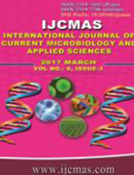


 National Academy of Agricultural Sciences (NAAS)
National Academy of Agricultural Sciences (NAAS)

|
PRINT ISSN : 2319-7692
Online ISSN : 2319-7706 Issues : 12 per year Publisher : Excellent Publishers Email : editorijcmas@gmail.com / submit@ijcmas.com Editor-in-chief: Dr.M.Prakash Index Copernicus ICV 2018: 95.39 NAAS RATING 2020: 5.38 |
Lipopolysaccharide (LPS) is the major outer membrane component of the Gram negative bacteria, supporting the structural integrity and protecting the membrane from chemical attack. Lipopolysaccharide is pyrogenic, causes endotoxic shock and induces the clinical manifestations of infections. It has the broad applications in cell stimulation experiments which abstract, the basis for studies on the isolation, purification and characterization of LPS. The main problem with LPS purification procedures is the contamination with nucleic acids and proteins which potentially interfere with downstream applications. In this study, we evaluated the Poteinase K-hot-phenol-water extraction method and methanol-chloroform method based on the ease of extraction, purity and the functionality of the LPSs isolated from Salmonella Typhimurium. The purity of LPSs was evaluated by silver and Coomassie blue staining of SDS-PAGE and functionality was confirmed by rabbit pyrogen assay. LPS extracted by Proteinase K-hot-phenol-water method demonstrated a typical ladder pattern upon silver staining and no contaminating protein was observed by coomassie blue staining whereas, methanol-chloroform extracted LPS was devoid of such ladder pattern and revealed lighter bands of protein contamination. Parental administration of both purified LPSs resulted in substantial increase of rabbit’s body temperature and confirmed the functional activity of both LPSs. Finally it was concluded that the, extraction of LPS by methanol-chloroform method was much easy, less expensive and safer but lacks purity, whereas Proteinase-K-hot phenol water method was tedious, but yielded LPS of high purity.
 |
 |
 |
 |
 |